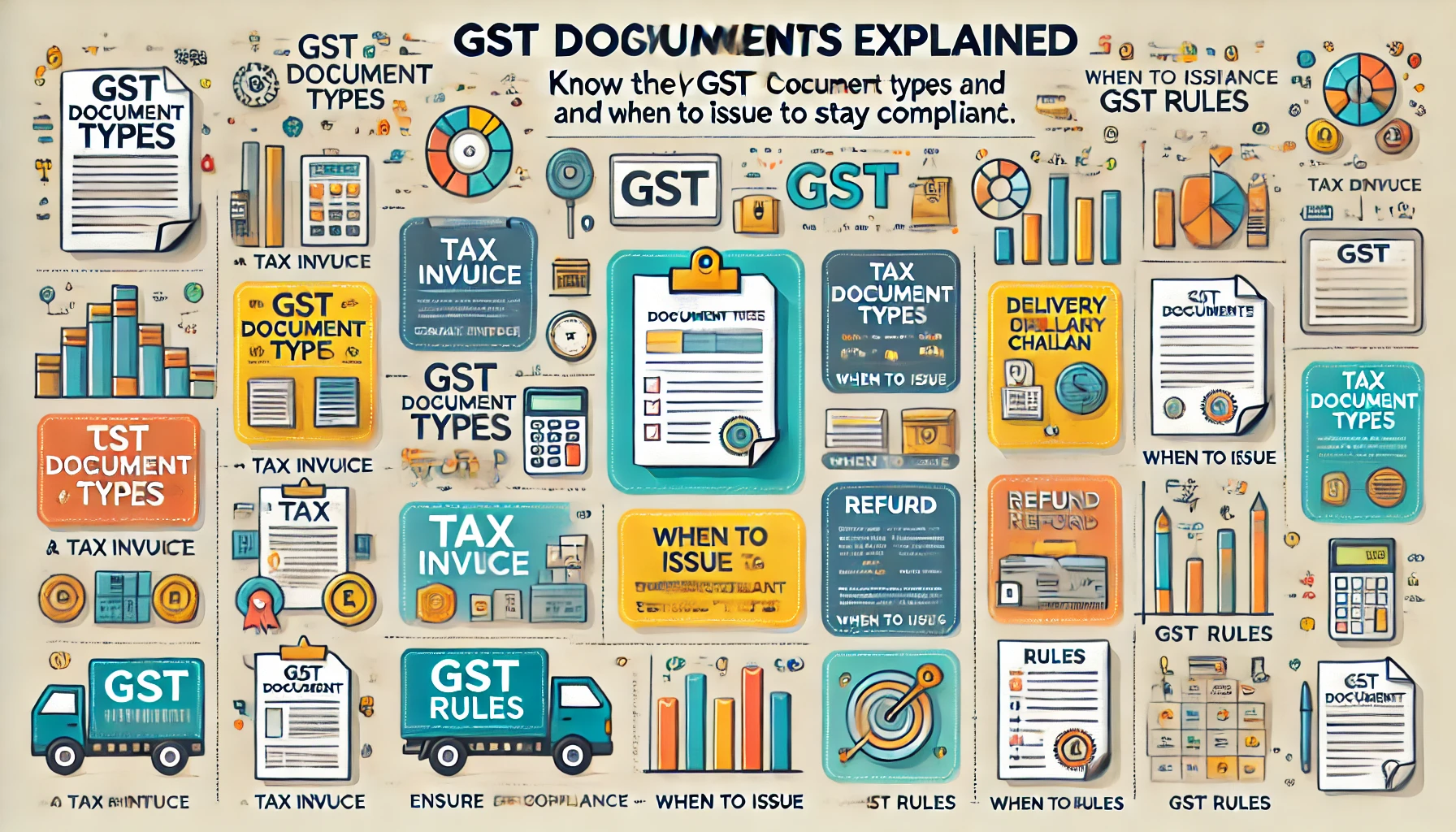The Goods and Services Tax (GST) system in India has streamlined the taxation process, but it also introduced a range of documentation requirements for businesses. Each document serves a distinct purpose to ensure proper compliance, accurate tax payments, and proper record-keeping. In this blog post, we’ll walk through the various types of invoices and documents that a supplier or recipient may need to issue under GST, along with important rules related to each.
1. Tax Invoice
A Tax Invoice is the most common document issued when taxable goods or services are supplied. This invoice outlines the details of the transaction, including the price of the goods or services, the applicable GST rate, and the amount of GST payable. It is a mandatory document that suppliers issue for most taxable supplies.
2. Bill of Supply
For businesses that have opted for the Composition Scheme or are supplying exempt goods or services, a regular tax invoice is not required. Instead, they must issue a Bill of Supply. This document is used to signify the sale of goods or services under these specific circumstances and is often simpler than a regular tax invoice, as it does not include GST.
3. Self-Invoice under Reverse Charge Mechanism (RCM)
The Reverse Charge Mechanism (RCM) is a special provision in GST where the recipient of goods or services, instead of the supplier, is responsible for paying the tax. In cases where the recipient is procuring goods or services from an unregistered supplier, the recipient is required to issue a Self-Invoice to comply with RCM provisions.
4. ISD Invoice
An Input Service Distributor (ISD) is a business entity that distributes the Input Tax Credit (ITC) to its branches. Under GST, an ISD Invoice is required to document and distribute the ITC across branches that share the same PAN. This invoice ensures that the ITC is appropriately allocated to each branch.
5. Receipt Voucher
In cases where a business receives an advance payment for goods or services but the actual supply has not yet occurred, it must issue a Receipt Voucher. This document serves as proof of receipt of the payment and helps maintain proper records for tax compliance. No GST is levied until the supply is actually made.
6. Payment Voucher
Under certain circumstances, the recipient of goods or services is responsible for paying GST instead of the supplier, particularly in the case of reverse charge transactions. In such cases, the recipient must issue a Payment Voucher to indicate the payment of tax.
7. Refund Voucher
If a business has issued a receipt voucher for an advance payment but fails to make the supply (or the transaction is cancelled), a Refund Voucher is required. This document is used to refund the advance payment, and if no tax invoice was issued, it ensures that the advance payment is properly recorded and refunded.
8. Debit Note
A Debit Note is issued by the supplier when there is a discrepancy in the original invoice. For example, if the supplier has undercharged the customer for goods or services, the supplier must issue a debit note for the balance amount. It serves as an amendment to the original invoice.
9. Credit Note
On the other hand, a Credit Note is issued when the customer returns goods, or if there is an issue with the amount charged on the original invoice. If the supplier has overcharged or the goods are returned, a credit note is issued, allowing the customer to adjust the overpaid amount against future liabilities.
10. Delivery Challan
While not explicitly defined under GST, a Delivery Challan is used when goods are being transported, but the transaction may or may not lead to a supply. It serves as a document for the transportation of goods, ensuring that the movement of goods is recorded, even if the transaction is not complete.
Rules for Issuing GST Documents
To help you understand the requirements for each document, here is a quick reference chart summarizing the rules for issuing these documents under GST:
| Document | Purpose | When to Issue | GST Rules |
|---|---|---|---|
| Tax Invoice | For taxable supply of goods or services | Always for taxable supplies | Must contain GST details (GSTIN, amount, HSN/SAC codes). |
| Bill of Supply | For exempt goods or composition scheme supplies | When the supplier is under the composition scheme or supplying exempt goods | No GST charged; cannot claim ITC. |
| Self-Invoice (RCM) | For reverse charge mechanism transactions | When recipient is liable to pay GST (unregistered supplier) | Issued by recipient, includes GST details and tax paid. |
| ISD Invoice | For distribution of ITC by Input Service Distributor | When distributing ITC across branches with the same PAN | Should specify the amount of ITC being distributed. |
| Receipt Voucher | For advance payments | When advance is received, and no supply is made yet | No GST is payable until the supply occurs. |
| Payment Voucher | For reverse charge transactions | When recipient is liable to pay GST under RCM | Must be issued by the recipient, mentioning tax details. |
| Refund Voucher | To refund an advance payment | When the advance payment is refunded without the supply taking place | Issued if no supply is made after a receipt voucher is issued. |
| Debit Note | To correct undercharging | When GST charged is less than the correct amount | Must mention the difference between the original invoice and debit. |
| Credit Note | To correct overcharging or goods return | When goods are returned, or charges are disputed by the customer | Adjusts the value of the original tax invoice for future liabilities. |
| Delivery Challan | For transportation of goods | When goods are being transported, and supply may or may not occur | Contains details of the goods in transit; no GST until supply occurs. |
Why Are These Documents Important?
Each of these documents serves a unique function in the GST system. Whether it’s ensuring the right amount of tax is paid or enabling businesses to claim Input Tax Credit (ITC), having the correct documentation is crucial for compliance with the law. These documents also help in keeping accurate financial records, which are vital for audits and business transparency.

Hi, I’m Vishal
Founder of FinTaxExpert.in, with 7+ years of experience in taxation, audits, and corporate finance.
✍️ I’m passionate about writing and researching in the fields of taxation and finance.
📖 Learn more about us at FinTaxExpert.in.

